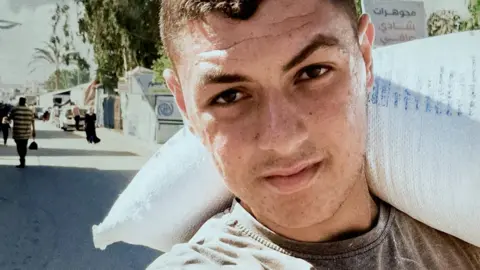As the sun sets over a displacement camp in southern Gaza, 20-year-old Mosab al-Trtori crouches by a row of pepper, tomato and aubergine seedlings planted in the sand.
Salty water and poor soil stop most of them yielding crops, but his occasional small harvests help feed his family in a place where even the most basic ingredients can be impossible to find, and where the day is often dominated by the search for food.
Mosab is luckier than most in Gaza – his family can afford to buy food, unlike many other civilians.
Before the war, they lived in a large two-storey house in the southern city of Rafah, where he and his siblings each had their own room. Mosab was an engineering student and also ran a YouTube gaming channel.
Now, Mosab lives in the sprawling al-Mawasi camp on the Mediterranean, sleeping in tents with eight family members: his parents, three siblings, grandmother, and two cousins, whose immediate families, he says, were kiIIed in Israeli strikes.
He now uses his social media accounts to document his life in a war zone.
Food is constantly on people’s minds. “At times we’ve wished for dҽath rather than to continue living in these conditions, always thinking about food and water,” he says.
Credit: Reuters
Israel does not allow international journalists free access to Gaza, but Mosab shared with the BBC a series of videos, voice notes and photos captured over a single day last month that reveal the struggle for him and others to find food, water, and cooking fuel.
He was searching for the ingredients to make mujaddara – a popular Arab dish made of lentils, rice, onions and sometimes garlic.
Gaza has been ravaged by hunger and malnutrition, with a United Nations-backed food security body confirming famine in Gaza City for the first time in August. Over that month alone, there were 185 dҽaths as a result of malnutrition, according to the Hamas-run health ministry.
Aid agencies, senior UN officials, the UK government and others all say the famine and starvation in Gaza are a result of Israel’s actions. Prime Minister Benjamin Netanyahu has repeatedly denied starvation is taking place and has said that, where there is hunger, it is the fault of aid agencies and Hamas.
Every day, Mosab heads to the street markets. His family sends him because he is the best haggler, he says.
Despite its simple ingredients, mujaddara is now reserved for the middle classes, he says.
While those with access to cash can shop in markets, others in Mosab’s camp rely completely on aid. The United Nations says more than 2,000 people have been kiIIed around aid sites and convoys in recent months. In August, it said most of the kiIIings were by the Israeli military. Israel denies this.
“Just yesterday, our neighbour was injured [in Israeli military gunfire], and another neighbour was also injured – one of them took two bullets,” Mosab says.
He feels guilty that others around him have no choice but to go to the aid sites and says he is in ‘constant fear’ that his family’s relatively privileged situation will worsen.
Some of the food on sale at the market comes from aid lorries – stolen by gangs and sold on to vendors.
“In reality, here in Gaza, we’re living off the work of thieves.”
Mosab
Stock is limited, some of it rotten, and the lack of available produce has dramatically driven up prices, making even basic items unaffordable for many, he says.
He spends two hours walking in scorching heat to find, and haggle over, ingredients. Staples like onions, which he knows will lift his family’s spirits, are a luxury in Gaza.
A single clove of garlic costs him £2 ($3) – about 10 times what his family used to pay for a pack of four whole bulbs.
He also manages to track down the other ingredients he needs. “We bought brown lentils and whole lentils, rice, I also got some tomato sauce to go on top, and a little onion, because mujaddara is all about the onions,” he says.
Like food, cash is in short supply in Gaza, as ATMs and banks have been destroyed or ceased operating during the war, and large injections of cash have been barred by Israel, which says they would be used by Hamas.
Mosab says the commission rates the family have to pay to get cash can be more than 50%.
The financial crisis is deepening, he says, and families like his may not be able to sustain even their current standard of living for much longer.
People also directly sell on the goods they have risked their lives for at aid sites.
“They sell it to you, but at an astronomical price. You end up begging them to sell,” Mosab says.
